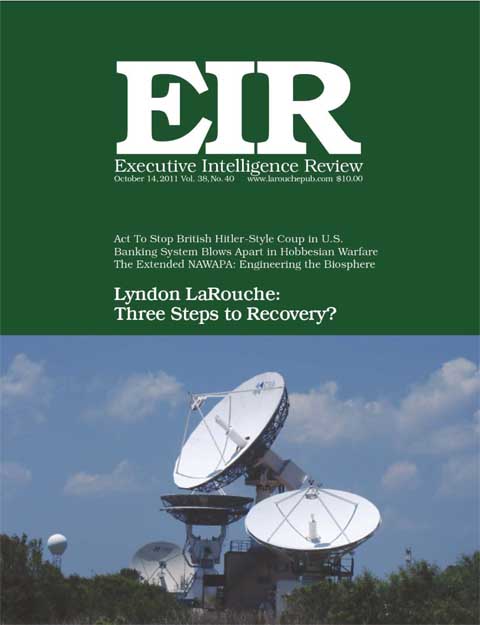|
.
|
|
|
|
 |
|
|
September 12, 2011
A NOTE TO THE READER:
Since the February 1763 ``Peace of Paris,'' the dominant history of the world has been chiefly divided, for most of that time up to the present moment, between two leading, contending, English-speaking currents of the history of the planet. These two have been the British empire, on the one side, and, on the other, our own United States' republic. Should the British empire, the implicit adversary of our United States since 1763, continue to be arrayed as the controlling force on this planet still today, the entirety of the planet would plummet, very soon, into a nightmare far worse than a planet-wide ``new dark age.'' This has threatened to be the end of the line for a trend which had been operating since the assassinations of President John F. Kennedy and his brother Robert. Unless there were a change away from this still present trend since the two Kennedy assassinations, the collapse of the economy of the planet as a whole were, probably, the option presently in sight now.
Soon, our U.S. quarrel with the British Empire will be settled in one way, or another. The outcome of this quarrel will depend upon considerations which must take into account issues in which leading nations on Earth, such as the United States, Russia, China, and India, must work in concert, to meet the challenge of the presently oncoming turn in our galaxy. On that account, we find ourselves as if locked, for the moment, in a time during which we are now threatened with a continuation of the recent trend of worsening failure by the present government of our United States. A failure to check the pro-genocidal impulses of the British monarchy now, would virtually assure the descent of the planet into a planet-wide ``new dark age.''... |
|
|
|
|
|
|
The Past Week's News, at a Glance:
|
|
|
|
|
This Week's Cover
- Three Steps to Recovery?
by Lyndon H. LaRouche, Jr.
Presently, the leading hope for mankind is centered, chiefly, on the possible roles of the United States, Russia, and China, and with India soon after. Therefore, these four are the leading partners on which the world's peoples must rely for the immediate years ahead, to establish the cooperation among sovereign nationstates that will bring humanity into a system of emerging worldwide initiatives, which express the unique role of mankind in the Solar System and beyond.
National
Economics
Science
- The Extended NAWAPA:
Engineering the Biosphere
An LPAC video focuses on how, in a post-Obama world, NAWAPA will become a new standard for international cooperation. It examines four specific projects, each representing a different region of the world. The case-studies begin with Africa, followed by Central Asia, Central and South America, and conclude with the development of the Arctic region.
|
|
|
All rights reserved © 2011, EIRNS
|
Subscribe to EIR Online
For all questions regarding your subscription to EIR Online, or questions or comments regarding the EIR Online website's contents or design, please contact eironline@larouchepub.com.
|
|
|


